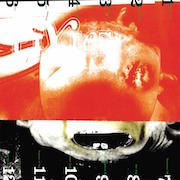There comes a moment, roughly three and half listens into Head Carrier, Pixies’ sixth studio album and the second since their reformation, that I start to wonder why I liked Pixies in the first place. That probably makes it sound like Head Carrier is an awful album. It isn’t. It is, in fact, a fairly decent one. But it turns out that the difference between a decent Pixies album and a brilliant one, while small and pin pointable, is hard for the listener to overcome.
Because Head Carrier certainly sounds a lot like Pixies. It has the ear worm, slightly sleazy riffs and spidery guitar lines that Joey Santiago has long called his own (‘Oona’); it has large, bounce-up-and-down choruses (‘Head Carrier’); it has Frank Black’s throat-shredding vocals (the AC/DCish ‘Baal’s Back’); and it has the distinctive intertwining of male and female vocals (the wistful ‘Might As Well Be Gone’)
Sometimes this retrovision works pretty well. Take ‘Um Chagga Lagga’, the album’s first single: it consists of three minutes or rockabilly thrash, call and response vocals and a searing Joey Santiago guitar solo, making it a close cousin to ‘Vamos’ off Come On Pilgrim, Pixies’ 1987 debut mini album.
But what differentiates ‘Um Chagga Lagga’ from ‘Vamos’, is telling. Because ‘Vamos’, with its Spanish chorus, sudden changes in speed and guitar solo that seems to fly in from another song entirely, is fundamentally weird: it sounds deranged, desperate even. ‘Um Chagga Lagga’, on the other hand, sounds like a solid rock song, one that you could imagine thousands of bands dreaming up, if not necessarily accomplishing, in their garages.
This, it turns out, is typical of Head Carrier. It’s a good album, one that won’t destroy or enhance Pixies’ reputation. You’ll enjoy listening to it and won’t necessarily slink off to the bar when they play songs from it on their forthcoming tours. You’d almost call it promising, were it not the sixth album from Pixies, one of the most important guitar bands in indie rock history.
Missing in Head Carrier, however, are the vital ingredients that made Pixies stand out from the other rock bands of their era, the spark that made Pixies Pixies. The 12 songs here have none of the weird splendour of ‘Velouria’; the inherent menace of ‘Monkey Gone to Heaven’; none of the endearing, desperate scrappiness of ‘Broken Face’. And that, it turns out, is a pretty big loss.
Instead, Pixies sound professional and polished throughout, with Joey Santiago’s guitar sound vacuum packed rather than unsheathed and menacing. Drummer David Lovering recently told the Evening Standard that the band “knew the songs backwards and forwards” by the time they started recording Head Carrier and you kind of wish they hadn’t.
Take ‘Tenement Song’: it sounds like classic Pixies, the restrained verse giving way to rousing, guitar-laden chorus, Frank Black’s vocal mingling with that of new bass player Paz Lenchantin to create brilliant melodic texture. There’s even a few bars where they slip from rock’s beloved four four time signature. It’s a great song, one of the best on the album, but it sounds tame, almost over-rehearsed, compared to the brutal heights of the Pixies’ catalogue.
This feeling of something lacking on Head Carrier is exacerbated by a number of songs that nod to past Pixies’ triumphs. ‘All I Think About Now’, for example, has an opening guitar riff that sounds like a tribute to ‘Where is My Mind’ – the same tone, allayed to similar notes and rhythm – but tied to a song that is nowhere near as good. Maybe this is a deliberate move, given that ‘All I Think About Now’ is intended as a thank-you letter to departed bass player Kim Deal. But the result is infuriating. This, it seems to taunt, it what you could have had.
Of course, Pixies owe us nothing and I am glad that Head Carrier exists. But what makes the album’s conservatism so frustrating is that this – the second album after their reformation – is when Pixies could have cut loose, having taken the bouquets and brickbats full on the face with their first post-reformation album, Indie Cindy. In 2016, Pixies could have gone where they wanted, following in the footsteps of Dinosaur Jr or Suede, bands who used their second post-reformation album to cut loose and try new things.
Instead, Pixies have played it straight and stayed in their lane, their once vital weirdness cast into the laundry basket like a vampire costume post Halloween. Head Carrier is 80% classic Pixies. But it turns out the missing 20% is as fundamental as oxygen is to air.


